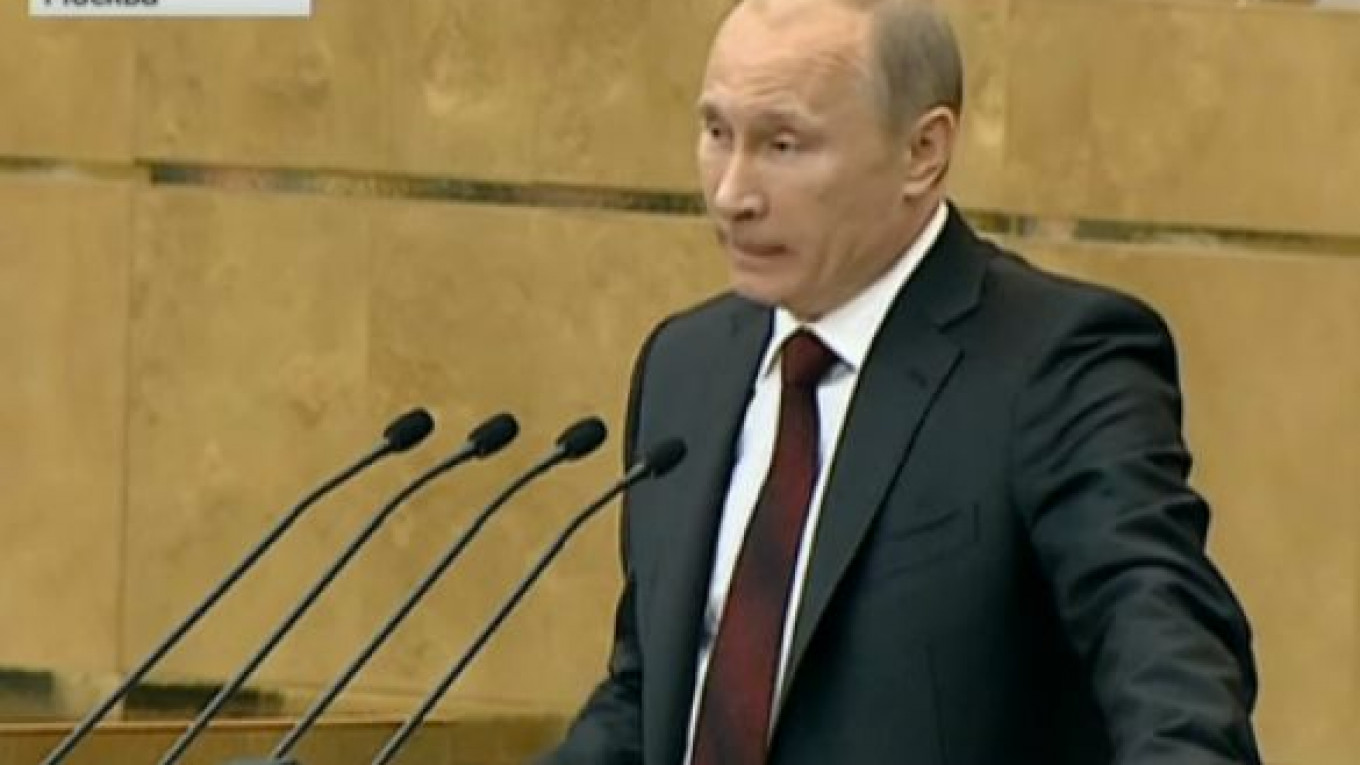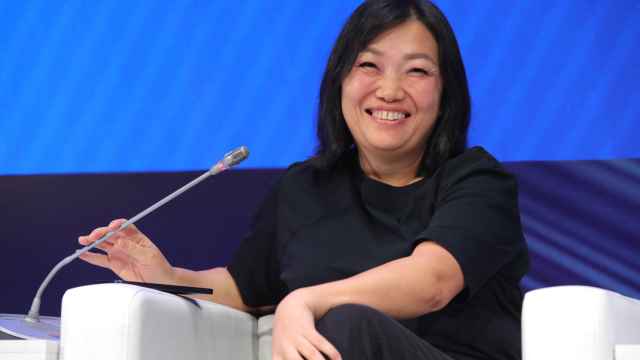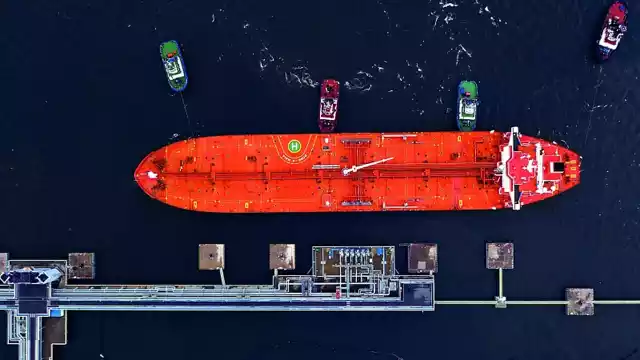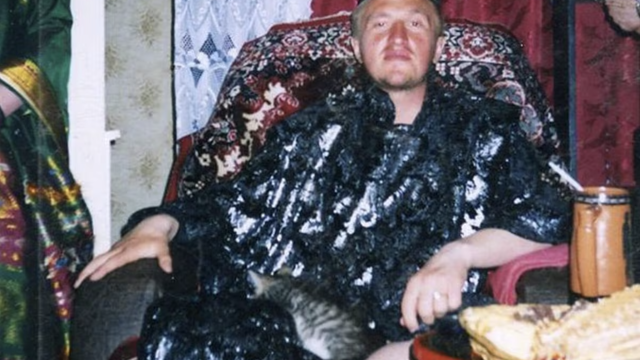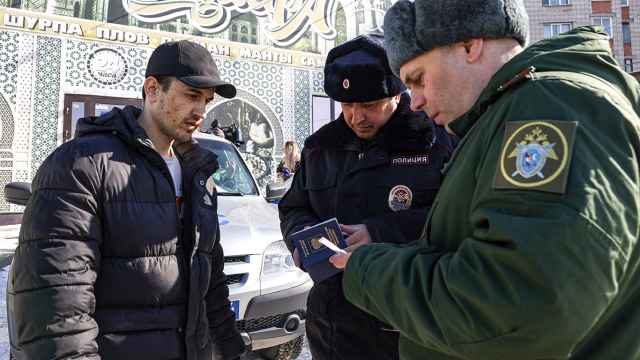Vladimir Putin addressed the State Duma on Wednesday with a speech reviewing the achievements of his government and outlining five priority areas for the future. After his speech, he answered questions from deputies on a range of topics, including Russia's WTO entry, the Constitutional provision regarding presidential term limits and the disputed mayoral election in Astrakhan. Read our chronicle of the proceedings below, and check back this evening for an article on the address.
3:42 p.m., Putin on Agriculture Industry After WTO Entry: Putin said the state had tools at its disposal to help ease the transition for the agriculture industry into the World Trade Organization.
Konstantin Babkin, the co-owner of the country's largest producer of farm equipment, has initiated a movement to block Russia's entry into the global trade body on the grounds that it will harm domestic industry. Some Communist Party Duma deputies are reportedly against the move as well.
Import duties on a variety of products will decrease once Russia enters the WTO, as it is expected to later this year.
Putin said that an agreement was made with the WTO allowing Russia to grant the agriculture industry up to $9 billion in subsidies over the next two years to help the sector compete with cheaper foreign imports.
3:07 p.m., Putin Says He Supports Limiting Presidents to Two Terms: Putin said it would be “reasonable” to remove the word “consecutive” from the Constitutional provision regarding allowable presidential terms by a single person.
The clause, which limits an individual from being president for more than two consecutive terms, has caused controversy over its meaning. Putin won his third non-consecutive term as president last month after serving in the office from 2000 to 2008.
“As regards removing from the Constitution 'two consecutive terms' and making it simply 'two terms,' I think it's reasonable. It can absolutely be considered — we should do it together with all the [Duma] fractions,” Putin said in response to a question by Communist Party deputy Vladimir Bortko, Interfax reported.
He said he would nonetheless have the opportunity to run for president again in 2018 if he so chooses, since he was elected this year under the current law.
2:55 p.m., Putin on 'Presidential Filter' in Gubernatorial Elections: Putin said he will support a so-called “presidential filter” for direct gubernatorial elections if it will be “transparent and understandable to the public,” Interfax reported.
Putin expressed support for such a mechanism after President Dmitry Medvedev proposed last year that elections for governors be reinstated. Medvedev has said he is against the president having a say in who runs in gubernatorial races.
2:47 p.m., New Cabinet Will Change 'Significantly': Putin said the makeup of the Cabinet would change “significantly” after he leaves the post of prime minister and said firings will not be on the basis of poor performance.
“We will be significantly changing the administrative team. But not because the people do not deserve their work being given a positive, satisfactory evaluation,” Putin said in answer to a question by a Duma deputy, Interfax reported.
“No — it's simply that kind of work. In certain areas it's very difficult to be under constant pressure,” he said.
2:35 p.m., Putin Addresses Situation in Astrakhan: Putin said in answer to a question from Just Russia parliamentarian Yelena Drapeko that if election violations are discovered to have taken place in the disputed Astrakhan mayoral election that would affect who won, a court should annul the results.
He said Oleg Shein, the Astrakhan mayoral candidate who has been on a hunger strike for 27 days in protest against alleged vote fraud in last month's mayoral election, should have taken his complaint to court, Interfax reported.
“As far as I know, Oleg Shein began a hunger strike but did not go to court. Honestly, it's a little strange. Why starve? Perhaps a court will still investigate and everyone will agree with the results of that investigation,” Putin said.
Following Putin's response, the entire Just Russia fraction left the Duma hall.
2:12 p.m., Putin's Five Priorities: Putin has concluded his speech and is currently answering questions from Duma party fractions. In his speech, he promised in his first first decree as president to lay out a “road map” for the fulfillment of all his pre-election initiatives. He called for a focus on questions having “strategic, principle meaning and connection with our historical perspective as a nation.” He named five priorities for the country:
Priority #1: Demographics: “In Russia today, every person counts,” Putin said. The country needs “strong prosperous families with many children,” he said.
Priority #2: Development of the regions. Special attention should be made to Siberia and the Far East.
Priority #3: New, high-quality jobs. “We should provide interesting and well-paying jobs,” Putin said. Average wages should rise by 60 to 70 percent by 2020, he said.
Priority #4: Building a new economy. “We should be ready for any external shocks,” Putin said. Reserve funds should work for macroeconomic stability, he said.
Priority #5: Developing cooperation in Eurasia. Russia would have a stronger position in the world through new integration in Eurasia. “Creation of a common economic space is the most important event in post-Soviet space since the collapse of the Soviet Union.” Russia is in a customs union with allies Belarus and Kazakhstan.
1:48 p.m., 'Post-Soviet Period is Over': Putin concluded his one-and-a-half-hour speech by saying the post-Soviet period has ended and that the country is entering a new time. He received a standing ovation from the Duma deputies as he left the podium. Soon he will be answering questions from the Duma fractions.
1:33 p.m., Putin on Culture: Putin said new cultural institutions, including theaters and so-called “houses of culture,” should be created and said priority should be put on development in small cities and villages. He said the status and incomes of employees of cultural institutions should be increased.
1:29 p.m., Putin on Election Cameras in Schools: Putin said the technology installed in schools for monitoring last month’s presidential vote, including high-speed Internet capability and surveillance cameras, should be used for educational purposes, such as distance learning.
1:24 p.m., Putin on Children's Issues: Putin said new mothers should have the opportunity to retain and even raise their professional qualifications. He said families with a third child should receive 7,000-ruble monthly stipends until the child reaches the age of three.
1:20 p.m., Putin on Life Span: Putin said average life span in Russia has increased to 70 years and said it could reach 75 years by 2018.
1:14 p.m., Putin WTO Membership: Putin said WTO membership will strongly stimulate economic growth, and push domestic industry. He said it will give the country a platform to demand its rights.
Some opposition figures have expressed skepticism regarding the benefits of WTO membership for Russia.
1:09 p.m., Putin on Education: By 2018 Putin said salaries of university professors will be twice the average level of the region in which the institution is located. He said a system of granting loans to students should be created so that they can pay for daily needs. He said new dormitories should be created. Professional education should be adapted to the needs of the economy, Putin said. He said high-performing students will receive 5,000-ruble monthly stipends.
1:04 p.m., Putin on Jobs, Salary Levels: Putin said the average salary in Russia should increase 60 to 70 percent by 2020, RIA-Novosti reported. He said average income in 2011 was 25,600 rubles ($860) per month. He said more interesting, higher-quality jobs should be created in the country.
12:54 p.m., Putin on Business Climate: Putin said a competitive economic climate needs to be created. He noted that Belarus and Kazakhstan are both rated higher than Russia in terms of business climate. He said not a single economic goal can be achieved if the climate is not improved. Putin said work is going very slowly in this area and asked those present to help make proposals to improve this. He said the level of investment in Russia should be brought to 25% of GDP by 2015, noting that today it is about 20%.
12:50 p.m., Putin on Customs Union: Putin said the formation of the Customs Union with Belarus and Kazakhstan is the most important geopolitical step taken in the post-Soviet period.
12:47 p.m., Putin on Far East: Putin noted that Russia is the largest country in world and that the state should not just protect it but also develop it. He said priority should be put on development of the Far East and said growth there should be higher than in the country as a whole for a period of 10 to 15 years. He said the population should increase there, not decrease as it is doing now.
12:45 p.m., Putin on Crisis: Putin said Russia did not just overcome the crisis but has become stronger than it was before it.
He said first thing he will do when takes office as president is to create a roadmap for all the plans he’s announced.12:38 p.m., Putin on Industry: Putin said more than 2,000 new factories have been built over last four years, including in the pharmaceutical and IT industries. He said truck imports have gone down.
He said there are many problems in the defense industry and that it is one of the country’s most important sectors, for national defense and for the economy.12:34 p.m., Putin on Debt, Inflation: Putin has said a few times that certain European countries are losing elements of sovereignty by having such high debt levels, apparently referring to Greece, and noted Russia’s low debt levels. He said various state funds are increasing in value.
He said he wanted to put particular emphasis on the decrease in inflation, which he said has gone down from 13 percent to 6.1 percent.12:28 p.m., Putin on State Subsidies, Pensions: Putin noted that while Ukraine and France have increased the pension age, Russia has not. He said retired military veterans have had their pensions raised and that 1.5 million citizens have received housing with government support. He said annual increased been made to so-called “maternal capital,” subsidies for mothers with more than one child.
12:24 p.m., Putin on Income Levels: Putin said Russians’ incomes have increased every year during his tenure as prime minister, citing statistics. He said close attention must be paid to the increasing income stratification in the country.
12:21 p.m., Putin on Demographic Situation: Putin noted progress in the country’s demographic crisis, saying the country’s population reached 143 million people in 2011. He also noted the fact that Krasnoyarsk on Tuesday became the 14th city in Russia with over one million people. He said the country would soon undergo the “echo” of low birth rates in the 90s.
According to official information, six Duma deputies are not attending the session, Kommersant journalist Natalya Zhdanova said on Twitter.
Putin has promised to speak with journalists after the event.
12:16 p.m., Putin Begins Speech: Putin has begun his address: “The country has passed through a stressful elections period. After an election, a more important time always begins. We have general responsibility for the prosperity of Russia.”
12:13 p.m., Speech About to Begin: While waiting for Putin to begin his speech, guards from the have asked people not to shout or whistle. The hall is full.
All members of the Cabinet are expected to be present for Putin’s address, except for those currently outside the city.Duma Speaker Sergei Naryshkin is currently opening the session.
10:45 a.m., Police Break Up Protest Before Putin's Duma Speech: Police detained opposition leader Sergei Udaltsov as he and about 100 other people tried to rally outside the State Duma on Monday morning, hours before Prime Minister Vladimir Putin was to arrive to deliver a speech on the Cabinet's performance.
"We barely had time to walk up to the State Duma building," Udaltsov told Interfax. "We were walking along the sidewalks ... when police swooped in and started detaining practically everybody, one after the other."
It was not immediately clear how many people were detained during the so-called White State Duma protest.
Udaltsov, who heads the Left Front group, said that police "literally pulled me from the crowd and pushed me into a bus, which immediately drove off." He later said he had been taken to the police station to await processing and that his detention was baseless.
Police closed the sidewalks nearest the Duma building on Monday morning. Putin is to offer an overview of his work for the past year and take questions from lawmakers at a Duma session scheduled to start at noon.
A Message from The Moscow Times:
Dear readers,
We are facing unprecedented challenges. Russia's Prosecutor General's Office has designated The Moscow Times as an "undesirable" organization, criminalizing our work and putting our staff at risk of prosecution. This follows our earlier unjust labeling as a "foreign agent."
These actions are direct attempts to silence independent journalism in Russia. The authorities claim our work "discredits the decisions of the Russian leadership." We see things differently: we strive to provide accurate, unbiased reporting on Russia.
We, the journalists of The Moscow Times, refuse to be silenced. But to continue our work, we need your help.
Your support, no matter how small, makes a world of difference. If you can, please support us monthly starting from just $2. It's quick to set up, and every contribution makes a significant impact.
By supporting The Moscow Times, you're defending open, independent journalism in the face of repression. Thank you for standing with us.
Remind me later.


